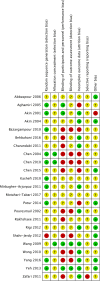The effectiveness of self-care and lifestyle interventions in primary dysmenorrhea: a systematic review and meta-analysis
- PMID: 30654775
- PMCID: PMC6337810
- DOI: 10.1186/s12906-019-2433-8
The effectiveness of self-care and lifestyle interventions in primary dysmenorrhea: a systematic review and meta-analysis
Abstract
Background: Menstrual pain is very common amongst young women. Despite the significant impact that menstrual pain has on academic attendance and performance, social activities and quality of life, most young women do not seek medical treatment but prefer to use self-care; commonly OTC analgesic medications and rest. Many women do not get significant pain relief from these methods, therefore other low cost, easy to learn self-care methods may be a valuable approach to management. This review and meta-analysis examines the evidence for participant lead self-care techniques.
Methods: A search of Medline, PsychINFO, Google Scholar and CINAHL was carried out in September 2017.
Results: Twenty-three trials including 2302 women were eligible and included in the meta-analysis. Studies examined self-delivered acupressure, exercise and heat as interventions. Risk of bias was unclear for many domains. All interventions showed a reduction in menstrual pain symptoms; exercise (g = 2.16, 95% CI 0.97 to 3.35) showed the largest effect size, with heat (g = 0.73, 95% CI 0.06 to 1.40) and acupressure (g = 0.56, 95% CI 0.10 to 1.03) showing more moderate effect sizes. Exercise (g = 0.48, 95% CI 0.12 to 0.83) and heat (g = 0.48, 95% CI 0.10 to 0.87), were more effective than analgesics in reducing pain intensity, whereas acupressure was significantly less effective (g = - 0.76, 95% CI -1.37 to - 0.15).
Conclusion: Exercise showed large effects, while acupressure and heat showed moderate effects in reducing menstrual pain compared to no treatment. Both exercise and heat are potential alternatives to analgesic medication. However, difficulties in controlling for non-specific effects, along with potential for bias, may influence study findings.
Keywords: Acupressure; Exercise; Heat; Period pain; Self-care.
Conflict of interest statement
Ethics approval and consent to participate
Not applicable.
Consent for publication
Not applicable.
Competing interests
MA and CS: As a medical research institute, National Institute of Complementary Medicine (NICM) receives research grants and donations from foundations, universities, government agencies and industry. Sponsors and donors provide untied and tied funding for work to advance the vision and mission of the Institute. This systematic review was not specifically supported by donor or sponsor funding to NICM.
KS: none known.
FM: none known.
Publisher’s Note
Springer Nature remains neutral with regard to jurisdictional claims in published maps and institutional affiliations.
Figures







References
-
- Subasinghe AK, Happo L, Jayasinghe YL, Garland SM, Gorelik A, Wark JD. Prevalence and severity of dysmenorrhoea, and management options reported by young Australian women. Aust Fam Physician. 2016;45(11):829–834. - PubMed
Publication types
MeSH terms
LinkOut - more resources
Full Text Sources
Medical

